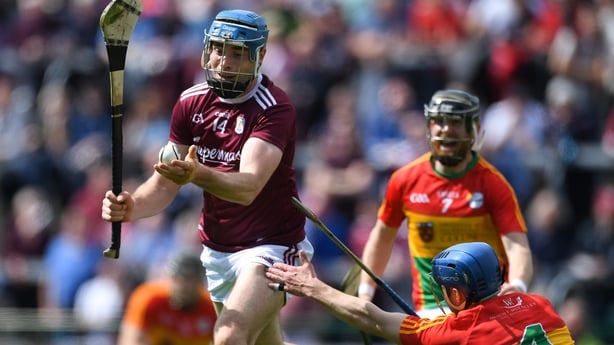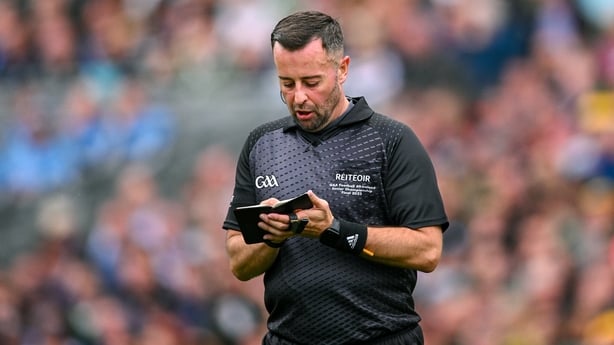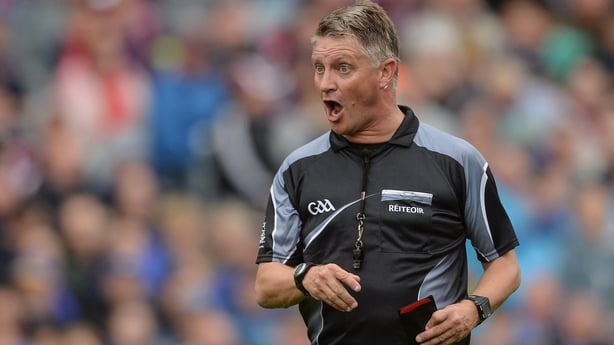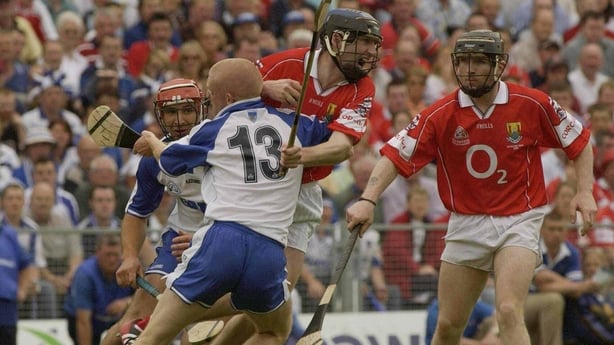Writing in his 2020 annual report, Ulster GAA secretary Brian McAvoy used the opportunity to voice his frustration with overcarrying in Gaelic football.
In his opinion the 'steps rule', which permits a player in possession of the ball to "carry it in the hand for a maximum of four consecutive steps or held in the hand for no longer than the time needed to take four steps" is no longer "fit for purpose".
Present in both codes, he was of the opinion that it is policed marginally better than in hurling, but that wasn’t saying much. There were too many instances throughout the year highlighting the liberal use of the rule.
"The game has evolved - it has changed from a game of 'catch and kick' to a possession game and the rule has failed to keep pace with the evolution of the game," he wrote.
"Where a rule can't be enforced it shouldn't be there."
Earlier that year, the Canadian County Committee brought forward a motion to the 2020 Congress seeking to amend the rule by replacing "four steps" with "two seconds".
It received just 9% support.
McAvoy was disappointed – yet not surprised – of the opinion that without a trial it would never curry favour with delegates. Added to that, he suspected there was too much resistance among the football fraternity.
"A 'time-based' approach rather than a 'steps-based' approach is obviously the approach," McAvoy wrote, urging the GAA's Standing Committee on Playing Rules (SCPR) to investigate further.

Chaired by David Hassan, the SCPR undertook further research. The results however did little to support the ‘time-based’ approach.
A report completed by Gaelic Stats looked at 15 inter-county games in 2022. In 50 randomly selected examples, it was found that the average number of steps taken was 5.4. The average time it took a player to take four steps in hurling was found to be 1.2 seconds.
McAvoy’s assertion was that, given how fast a player can take four steps now, it would be chaos to enforce. "They therefore, understandably, choose to ignore it."
The idea that referees purposefully chose to disregard the rule is something current referee David Gough would argue strongly against.
The Meath official, who takes charge of his first inter-county game since last year's All-Ireland final when Kildare and Cork clash in Division 2 today, says it is more about prioritising infringements than ignoring any.
"The referee’s attention, generally, is directed towards the contact, where the contact is between the player in possession and the player defending," he tells RTÉ Sport.
"It is rare to find a ref that can tell you exactly how many steps a player has taken in between plays – toe tap or solo – it’s just not possible to go through a game continuously to do that.
"To be exact is very difficult.

"I have seen incidents in the first four rounds of the league. In some cases I have seen goals scored after seven or eight, or more steps. That can be frustrating for us as referees to look at as much as it is for the teams trying to defend. The art of defending is being done away with there and it is extremely frustrating for players."
Goal-scoring opportunities are where the rule comes under the greatest scrutiny, and there are no shortage of examples in both codes of when a forward has been given far too much leeway with the rule.
From Gough's perspective it is clear that there are too many moving parts for an official to get the four-step rule right every time.
"Quite often the referee might be looking at where the player is in relation to penalty lines. He might be looking at the impending tackle coming in and anticipating foul play. He might be looking a the surroundings to see if there is a goal-scoring opportunity and the possibility of a black card.
"There are so many other rules and issues at that moment that the ref might be bracing himself for that and the steps rule might not be to the forefront of their mind. We have to think about so much while the player is in possession of the ball, that sometimes the ones we are least worried about are the ones that aren’t the most sanctionable.
"If we miss a free, or a contact, or a black, yellow or red card for a foul, we are not watching the technical stuff.
"We are trying to adjudicate on an exact science that is very difficult to implement. It’s definitely not being sanctioned properly by the referees at the moment."

Barry Kelly was part of the SCPR group that worked alongside the Larry McCarthy presidency term.
Kelly, who took charge of the 2006, 2008, 2012 and 2014 All-Ireland hurling finals, feels that the issue is well down the list of issues concerning referees.
"Other issues are more problematic," he tells RTÉ Sport.
"It’s generally well policed. The lad that takes six or seven steps is generally pulled up on it.
"I think it’s less prevalent than it was in the past."
The high-profile goal-scoring opportunities clearly stand out.
Eoin Murchan’s goal against Kerry from the half-time throw-in of the 2019 All-Ireland final replay, bursting from his own 65m to the Kerry 13m line after taking around a dozen steps before firing to the back of the net, is a notable one.
Superb start from the second half throw-in! Eoin Murchan with a @DubGAAOfficial goal pic.twitter.com/5ZlV9vLKVI
— The GAA (@officialgaa) September 14, 2019
Yet overall at least Kelly appears to have a point about the issue not as visible as in the past.
In July 2003, an article appeared in the Irish Independent on the back of a weekend where overcarrying was rife in both codes.
Current Dublin football manager Dessie Farrell took nine steps before raising a green flag in Clones in a qualifier victory over Derry.
Cork’s Munster final victory over Waterford also came in for scrutiny, with the article suggesting that 36% of the Rebels’ scores shouldn’t have counted for overcarrying.
Alan Browne’s 51st-minute goal was the standout snapshot, where Pat Mulcahy took nine steps coming out of defence before handpassing to Tom Kenny who took seven steps before Setanta Ó hAilpín received the ball and had half a dozen steps to his name in the build-up to the goal.

"A six- or eight-step limit would be more realistic," the article concluded. "A four-step rule that cannot and will not be enforced is just a joke."
More than 20 years on and Gough himself struggles to come up with a better alternative.
"I’m not sure there is a quick solution. It would need a lot of thought. Clogging up the rule book and the mind of the referee further is not what we need as the biggest problem is there are too many rules."
Kelly feels the two-second rule isn’t an improvement on four steps - "I’d be amazed if that ever came in" - and feels it isn’t much of a blight on the game.
Simply, it is too far down the list of referee concerns.
During his time with the SCPR, it was hardly discussed among the many issues brought to meetings.
"As a fan watching on, no-one throws the remote at the TV if a player takes five steps. Or even maybe six if there is strong contact before getting the shot away.
"It’s just a way down the priority list for rules that might be changed."
Murchan would later be asked about his iconic goal against Kerry in the 2019 decider that referee Conor Lane found no fault with
After bouncing the ball five yards outside the D, the Na Fianna man scampered through before shooting on the 13-metre line. It was a goal for the ages, more dramatic perhaps by the desperation by David Moran to catch up with the flying defender.
But covering approximately 65 metres in two bounces and a solo?
"I've never gone back to count it. I do know there's a bit of debate around it. To be honest, if you put yourself in the position of that referee (Lane), it's going to be hard to know what's going on at all, in fairness."
Watch Derry v Dublin in the Allianz Football League on Saturday from 4.30pm on RTÉ2 and RTÉ Player, follow a live blog on rte.ie/sport and the RTÉ News app and listen to updates on Saturday Sport on RTÉ Radio 1
Watch highlights on Allianz League Sunday on RTÉ2 and RTÉ Player from 9.30pm, follow a live blog every Sunday afternoon on rte.ie/sport and the RTÉ News app and listen to live updates on Sunday Sport


